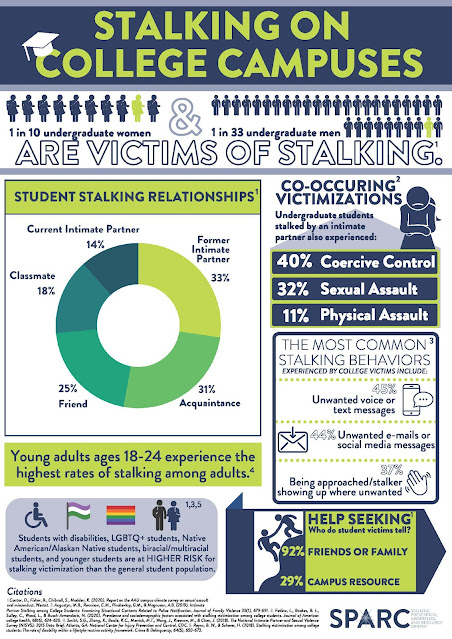Stalking
 |
| *No data was shared for students who were not male or female. |
When you learn more about stalking behaviors, you're more likely to notice them before they escalate, and you can take steps to protect yourself. If you discover that you are being currently being stalked—either in-person, online, or via technology—it can be unsettling and even dangerous. Consider taking steps to protect yourself or involve an authority figure who can help you.
What is stalking?
“Stalking is a pattern of repeated and unwanted attention, harassment, contact, or any other course of conduct directed at a specific person that would cause a reasonable person to feel fear,” according to the Department of Justice. Similar to crimes of sexual violence, stalking is about power and control.Stalking laws and definitions differ from state to state. You can read more about your state’s laws by visiting the Stalking Resource Center. Stalking behavior can take many forms including:
- Making threats against someone, or that person's family or friends
- Non-consensual communication, such as repeated phone calls, emails, text messages, and unwanted gifts
- Repeated physical or visual closeness, like waiting for an someone to arrive at certain locations, following someone, or watching someone from a distance
- Any other behavior used to contact, harass, track, or threaten someone
What is “the use of technology to stalk”?
One of the ways perpetrators stalk victims is through the use of technology. You may have heard the term cyberstalking to refer to these types of interactions. “Use of technology to stalk” is a broad term that is used to cover all forms stalking that rely on technology.
Some uses of technology to stalk include:
Some uses of technology to stalk include:
- Persistently sending unwanted communication through the internet, such as spamming someone’s email inbox or social media platform
- Posting threatening or personal information about someone on public internet forums
- Video-voyeurism, or installing video cameras that give the stalker access to someone’s personal life
- Using GPS or other software tracking systems to monitor someone without their knowledge or consent
- Using someone’s computer and/or spyware to track their computer activity
What are some common reactions to being stalked?
The DOJ uses “fear” to define the experience of being stalked, but there are other reactions that are just as important to consider. You might feel anxious, nervous, isolated, become stressed, or develop signs of depression.What should I do if I’m being stalked?
If you think you are being stalked, please know you are right to be concerned. Stalking may escalate in behavior. Consider the following tips to increase your safety and effectively report the crime.- Try to avoid the person stalking you. This can be difficult at times, especially if the person stalking you is close to you or your family.
- If you are being stalked through communication technology, like email or text messaging, make it clear that you wish to stop contact. Once you’ve made it clear, do not respond to further communication.
- Keep any evidence received from the stalker such as text messages, voicemails, letters, packages, emails, etc., but do not respond. You can do this by taking screenshots of conversations or even printing out email exchanges.
- Inform family, friends, supervisors, and co-workers of the situation.
- If you have children, create a code word that lets them know they need to leave the house or call the police.
- Consider reporting the stalking to local law enforcement.
- Keeping an accurate journal or log of all incidents connected to the stalking.
- Become familiar with computer safety and ways to stay safe online.
For students who have been impacted by stalking, please fill out a CARE referral to get them connected to resources on and off campus. Employees who have been impacted by domestic violence are encouraged to contact the Director of Labor Relations & Title IX Coordinator, Hayley Schwartzkopf, to access support, information, and resources.



Comments
Post a Comment